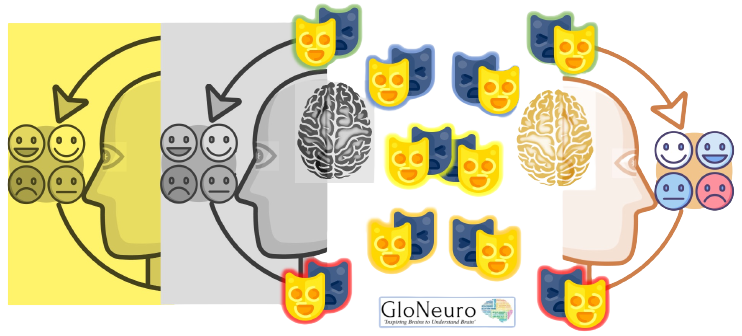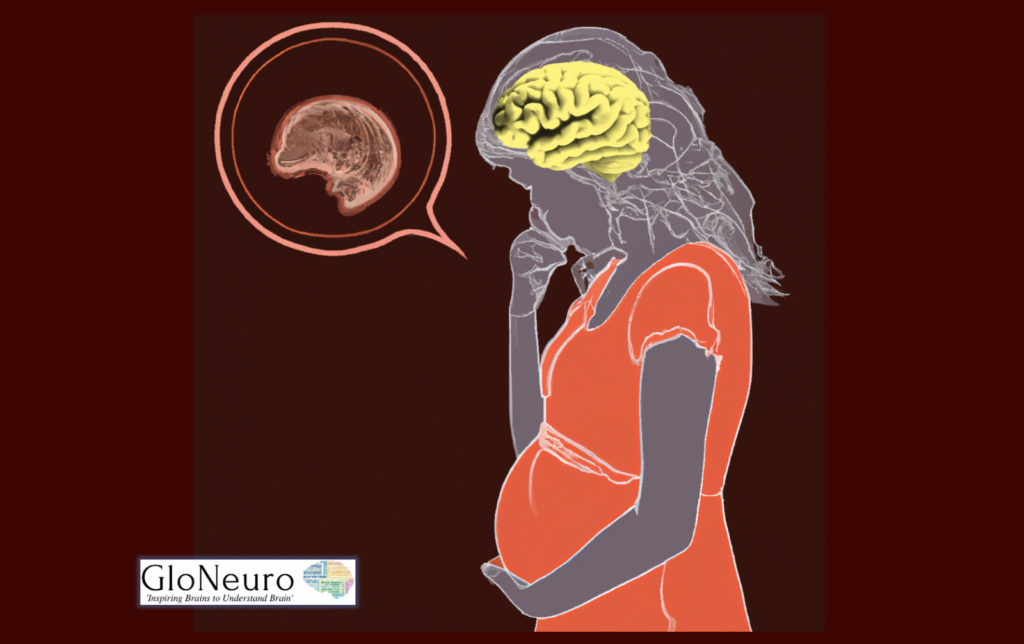July 10, 2023
Author: Ritika Bhardwaj
Editor: Dr. Jitendra Kumar Sinha
Step into the captivating world of maternal stress and its profound impact on the developing brain. Imagine a journey where the emotional experiences of a mother during pregnancy shape the neurological landscape of her unborn child. It’s a realm where the echoes of anxiety and stress reverberate within the intricate pathways of the fetal brain, influencing its structure and setting the stage for future mental health. Today, we delve into the enigmatic realm of maternal stress and its intricate dance with the developing brain. Brace yourself for a fascinating exploration that will unravel the secrets behind this compelling connection and shed light on the profound implications for both mother and child. Get ready to embark on a GloNeuro journey that will reshape your understanding of the power of maternal experiences on the intricate tapestry of human existence. Welcome to the captivating world of maternal stress and the developing brain.
Motherhood is a transformative journey filled with immeasurable joy, but it is not without its fair share of anxiety and stress. The emotional well-being of expectant mothers plays a pivotal role in shaping the developing foetal brain, setting the stage for a child’s lifelong trajectory. In this blog, we embark on a captivating exploration of the intricate field of neuroscience to understand the intergenerational transmission of trauma and its profound impact on children’s mental health.

Epigenetic Modifications: Unraveling the Genetic Influence
Epigenetics, the study of how environmental factors influence gene expression, has revealed the profound impact of maternal trauma on the developing foetal brain. Stressful experiences can induce epigenetic modifications in stress-related genes, altering stress reactivity and increasing the vulnerability to mental health issues. This fascinating research has shown that maternal trauma can cause epigenetic changes in genes like the glucocorticoid receptor gene (GR), a vital component of the body’s stress response system. Such modifications can modify stress reactivity and increase the likelihood of developing mental health disorders. This intricate process highlights the potential for intergenerational trauma transmission via epigenetic mechanisms.
To further elucidate the influence of maternal trauma on foetal brain development, researchers have conducted studies using animal models. Pregnant rats exposed to stressors such as constraint or predator exposure have shown alterations in stress responses in their offspring. These changes in behavior have been correlated with epigenetic modifications in stress-related genes. The findings suggest that the effects of maternal trauma can extend beyond the individual experiencing the trauma, affecting future generations through epigenetic processes.
The HPA Axis: Unraveling the Stress Response
The Hypothalamic-Pituitary-Adrenal (HPA) axis is a major neuroendocrine system that governs the body’s response to stress. When activated, the HPA axis releases stress hormones such as cortisol, which mobilize the body’s resources to deal with the stressor. However, exposure to persistent or severe stress, such as maternal trauma, can dysregulate the HPA axis, leading to long-term changes in stress response.
The impact of maternal trauma on the HPA axis has been explored in studies examining offspring of mothers who experienced post-traumatic stress disorder (PTSD) during pregnancy. These offspring have been found to exhibit elevated cortisol levels and more pronounced stress responses. The dysregulation of the stress response system can make individuals more vulnerable to mental health disorders such as anxiety, PTSD, and others. Understanding the intricate interplay between maternal trauma and the HPA axis sheds light on the long-lasting effects on the developing brain and stress response mechanisms.
Structural and Functional Brain Alterations: The Neural Consequences
Maternal trauma can have profound effects on the structural and functional development of the offspring’s brain, resulting in long-term psychological repercussions. The amygdala, a critical component of the brain’s fear and emotional processing circuits, has been shown to be overactive in individuals who have experienced maternal trauma. This increased amygdala sensitivity can lead to higher emotional arousal and difficulties in emotion regulation. Moreover, the prefrontal cortex, which plays critical roles in mental and emotional processing, may exhibit diminished connectivity with the amygdala, resulting in dysfunctional emotional response regulation.
Another brain region impacted by maternal trauma is the hippocampus, which is involved in the development of memories and the regulation of emotions. Stress during pregnancy has been found to contribute to decreased hippocampal volume in children. This structural alteration in the hippocampus can lead to learning and memory difficulties and increased vulnerability to stress. The intricate interplay between maternal trauma and its impact on brain structures underscores the importance of understanding the long-term consequences on mental health and well-being.
Impact on Mental Health and Cognitive Development: A Lifelong Influence
The prenatal environment plays a significant role in shaping a child’s emotional regulation and cognitive development. Maternal stress during pregnancy has been linked to various mental health disorders in offspring. Anxiety, stress, and attention-deficit/hyperactivity disorder (ADHD) have all been associated with maternal stress during pregnancy and the inherited predisposition for these disorders. High levels of stress hormones, such as cortisol, can influence foetal development, including the brain and stress response system. Disruptions in the development of these systems can increase the child’s susceptibility to mental health disorders later in life. Studies have shown that infants whose mothers experienced higher levels of stress during pregnancy are more likely to develop cognitive deficits, including issues with problem-solving, attention, and memory.
Understanding the intricate relationship between maternal anxiety and fetal brain development is crucial for promoting optimal mental health outcomes in children. It emphasizes the significance of early intervention and support for expectant mothers to mitigate the potential long-term consequences on their children’s well-being. Cognitive development and mental health are deeply intertwined, and the effects of maternal stress on cognition highlight the importance of prioritizing maternal mental well-being. By identifying and addressing maternal stressors during pregnancy, healthcare professionals can offer targeted support and interventions to promote optimal cognitive development in offspring.
Maternal anxiety is a multifaceted phenomenon influenced by various factors, including genetic predispositions, external stresses, and individual differences. However, it is essential to note that not all women who experience anxiety during pregnancy will exhibit negative consequences on the infant’s brain development. Similarly, not all cases of abnormal brain development can be solely attributed to maternal anxiety. The intricate interplay of numerous factors necessitates a comprehensive understanding of the complex mechanisms involved. Emphasizing the significance of aiding expecting mothers in managing their anxiety is crucial. Prenatal screening for mental health issues, such as anxiety, stress, and depression, is necessary to identify women who may require additional support. Preventive measures should be taken to reduce stigma and encourage open discussions surrounding mental health during pregnancy. Investing in maternal mental health not only benefits the mother but also promotes optimal foetal brain development, resulting in a happier and healthier next generation.
Taking time for self-care and engaging in mindfulness practices can be effective strategies for managing stress and anxiety during pregnancy. Expectant mothers should prioritize their well-being and seek support when needed. If an individual feels unusually tearful, numb, violent, or irritable, it may be an indication that stress reduction therapy or professional help is necessary. Access to appropriate resources and interventions can play a vital role in mitigating the impact of maternal stress on the developing foetal brain. Therefore, now we understand easily that the intricate relationship between maternal anxiety and foetal brain development underscores the need for comprehensive support systems. By prioritizing maternal mental health, we can positively shape the futures of both mothers and their children. Fostering resilience, emotional well-being, and cognitive development in the next generation starts with providing the necessary support and interventions during the critical period of pregnancy. By embracing a holistic approach to maternal mental health, we pave the way for a brighter and more resilient future for generations to come.
Reference:
- Yehuda, R., & Lehrner, A. (2018). Intergenerational transmission of trauma effects: putative role of epigenetic mechanisms. World psychiatry: official journal of the World Psychiatric Association (WPA), 17(3), 243–257. https://doi.org/10.1002/wps.20568.
- Ramdas, D. L., Sbrilli, M. D., & Laurent, H. K. (2022). Impact of maternal trauma-related psychopathology and life stress on HPA axis stress response. Archives of women’s mental health, 1-8.
- Buss, C., Entringer, S., Swanson, J. M., & Wadhwa, P. D. (2012). The Role of Stress in Brain Development: The Gestational Environment’s Long-Term Effects on the Brain. Cerebrum : the Dana forum on brain science, 2012, 4.
- Lautarescu Alexandra, Craig Michael C., Glover Vivette, (2019) Chapter Two – Prenatal stress: Effects on fetal and child brain development. https://doi.org/10.1016/bs.irn.2019.11.002.
- van den Heuvel, M. I. (2022). From the Womb into the World: Protecting the Fetal Brain from Maternal Stress During Pregnancy. Policy Insights from the Behavioral and Brain Sciences, 9(1), 96–103. https://doi.org/10.1177/23727322211068024.
Explore New Articles from GloNeuro
Exploring the Current Frontiers of Alzheimer’s Disease Research
Alzheimer’s disease remains a pressing global health challenge, affecting millions of individuals worldwide. According to World Health Organisation (WHO) data, currently more than 55 million people have dementia worldwide, over 60% of whom live in low-and middle-income countries. Every year, there are nearly 10 million new cases. Alzheimer disease is the most common form and may contribute to 60–70% of cases.



